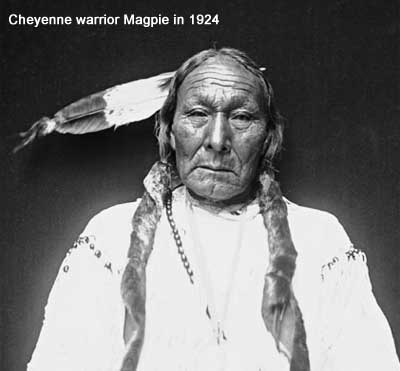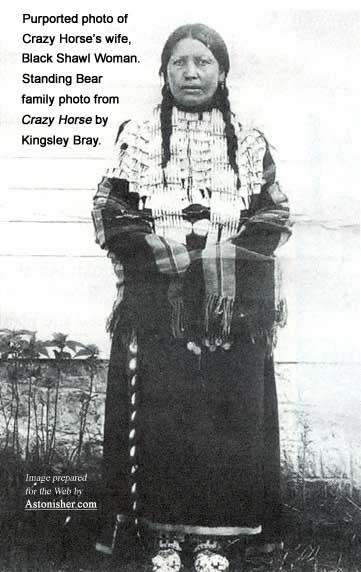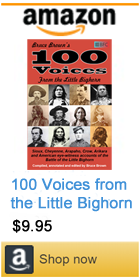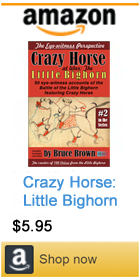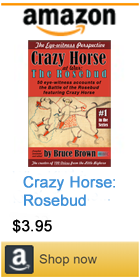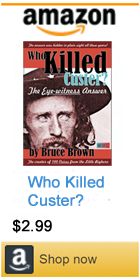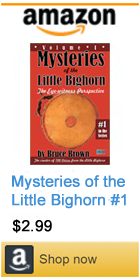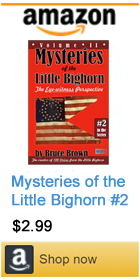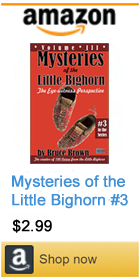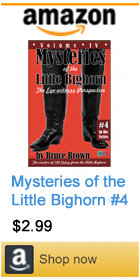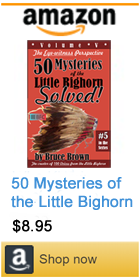|
||||||||||||||||
Bruce Brown's 100 Voices... Red Feather's Story of the Battle
The Indians were catching their ponies and running to the bluff-hills near there. When Red Feather was putting his bridle on his pony, Crazy Horse came out with his bridle and rifle, and said to Red Feather, "Our ponies aren't in yet." Red Feather said, "Take any horse." Red Feather had his horse ready, so he followed the others onto the hill. The hill was covered with men, warriors congregating from the Oglala and Uncpapa camps; the other camps were now in commotion. The sun was quite well up. The warriors were on horseback, while the women and children were on foot, running to the hill. Red Feather said, "Why wait for the women and children to get tired. Come on!" and started down the hill. [They] charged toward the soldiers; there were two places where flags were planted, and it was toward these they charged. As the Indians charged, the soldiers took down their flags and started to retreat toward the woods back of them. The Indians who couldn't catch their horses went in the woods on the side of the soldiers and shot at them from the side -- not the back, from the side. One flag bearer was shot down but sat up again. Red Feather was in front and hit him with his quirt. The man behind took the flag away from the soldier. When the soldiers got on their horses, it would have been wise if they had stayed in the woods and shoot [sic] from there. Two soldiers tried to get away, but the Indians overtook and killed them. There was dust around the woods. Some Indian shouted, "Give way; let the soldiers out. We can't get at them in there." Soon the soldiers came out and tried to go to the river. When they came out of the woods, they were excited and scattered, the Indians mixed with them. Just then Crazy Horse came; his horses were late in getting to the camp. He came amongst the soldiers. The soldiers all had six shooters in their hands and held off the Indians for a while. Red Feather could not get close, but shot as many horses from under the soldiers as he could. Red Feather saw a soldier fall off his horse, his foot caught in the stirrup, and he was dragged through the creek. A Ree was killed by the Oglalas near the river, the Standing Rock Indians recognizing [him] as probably being a scout. Below the point the soldiers crossed, they saw two men in white shirts and blue trousers running across the river; afterwards found they were scouts. Kicking Bear took after them and shouted, "These two are Indians - Palani! Red Feather shot the horse from under one and Kicking Bear followed the other and shot the first one twice. Red Feather stabbed him to death. The Indians followed the soldiers; ten of them got upon a hill. About ten o'clock the soldiers made a defense. The women and children shouted, "Another detachment coming!" They were on the high place. There was another body of soldiers east of the Cheyennes. They left Reno and went as fast as possible to the other end, but the Cheyennes were already fighting. The Oglalas acted as reinforcements. The Indians charged twice in the battle at the lower end of the camp. The first time the [Custer] soldiers were on foot. Then they retreated to their horses. In the first charge, Red Feather's horse was shot from under him. He came to an officer who was shot through the stomach who was sitting on the ground, holding a gun in his hand. Red Feather tried to take the gun away, but the officer dropped the gun and grabbed Red Feather. Red Feather was scared to death until someone shot the officer. The cartridges stuck in the [officer's] gun because it was too smoked from shooting.
One soldier on a sorrel horse tried to get around the Indians. He was on a sorrel horse with white legs. The Indians took after him, and shot and shot at him, but couldn't hit him or catch him. They saw some smoke and the report of a gun, and saw him fall off his horse. The Indians went over and [concluded] he had shot himself. Someone of the Uncpapa band got the horse and tied him to a stake. Everyone went to look at it. Gen. Scott: "I had information that the soldier, while using his revolver as a quirt, accidently shot himself." Red Feather: "All the soldiers were drunk. They didn't know what they were doing. The soldiers halted and dismounted and got on a hill; the Indians dismounted, too, and followed on hands and knees. They couldn't get near, but some crept up. When the soldiers left their horses, the Indians picked them up. The Indians sneaked up the hill in the ravine and [took cover] behind sagebrush. Red Feather's horse had been shot under him, so he was with the others who were on foot. If either side showed a head, the other side would shoot him down. An old man, Flying By, who wore a shirt and had his hair tied behind his head, kept shouting, which encouraged the young men. He was the only old man in front with the young ones. Arrows were a great deal used. The soldiers were without caps now. The Indians hid behind little rolls. The soldiers were on one side of the hill and the Indians on the other, a slight rise between them. While they were lying there shooting at one another, Crazy Horse came up on horseback -- with an eagle horn -- and rode between the two parties. The soldiers all fired at once, but didn't hit him. The Indians got the idea the soldiers' guns were empty and charged immediately on the soldiers. They charged right over the hill. Red Feather, yelling, shot into the soldiers who tried to get away. That made it easier for the Indians, who shot them from behind. Red Feather didn't follow them very far, but interested himself in taking saddlebags. He got four, with ground coffee and ammunition in them. Also a little can with something in it. He tasted it, and it was whiskey. It was a terrible battle. The worst he had ever seen, and he, Red Feather, has had some experience. Red Feather considered it a hard battle because both sides were brave warriors. Lakota Recollections of the Custer Fight: New Sources of Indian - Military History, compiled and edited by Richard G. Hardorff, The Arthur Clark Co., Spokane, WA, 1991, p 187 -192
|
||||||||||||||||



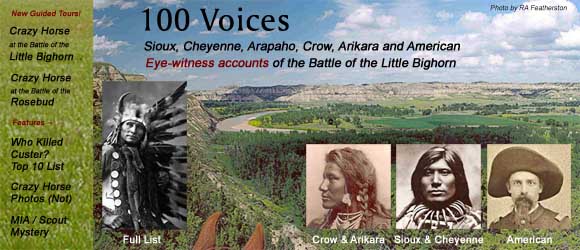
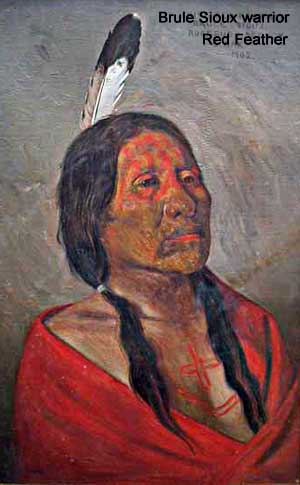 RED FEATHER had been up very late. He had been dancing and was after the girls. Went hard to sleep. Wakened later to hear some woman say, "You young men take the horses to pasture." Later on he heard someone say, "Go get horses -- buffaloes are stampeding!"
RED FEATHER had been up very late. He had been dancing and was after the girls. Went hard to sleep. Wakened later to hear some woman say, "You young men take the horses to pasture." Later on he heard someone say, "Go get horses -- buffaloes are stampeding!" 